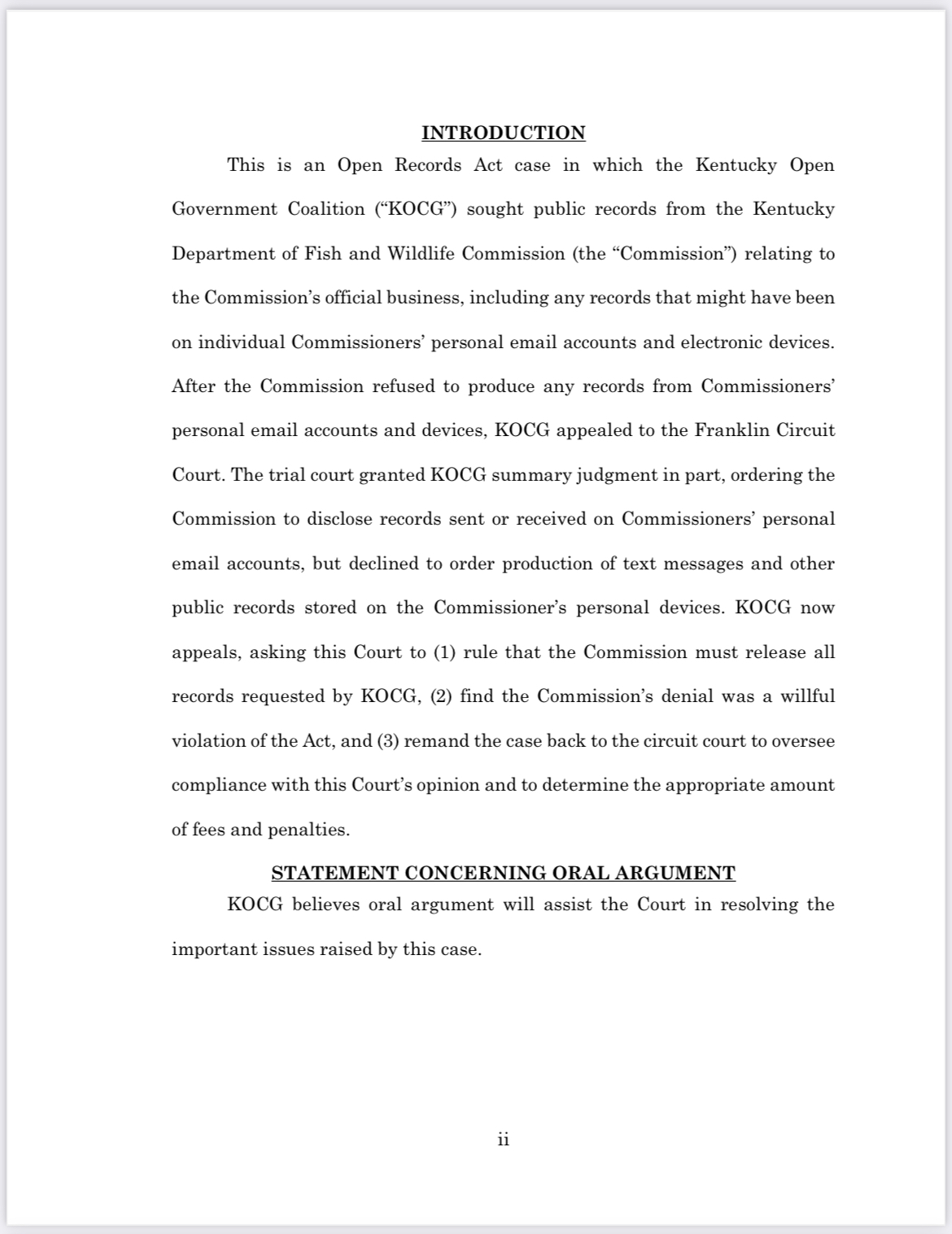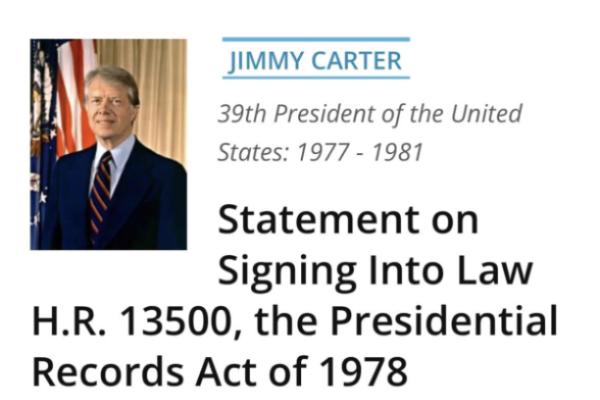
Kentucky Open Government Coalition v. Department of Kentucky Fish and Wildlife Resources Commission — an open records appeal from Franklin Circuit Court Judge Thomas Wingate’s January 25 “split opinion” — is moving forward in the Kentucky Court of Appeals following a delay.
That delay was a result of the Fish and Wildlife Commission’s unsuccessful attempt to bypass the Court of Appeals and transfer the case directly to the Supreme Court.
https://kyopengov.org/blog/department-fish-and-wildlife-commission-file…
https://m.facebook.com/story.php?story_fbid=1150113995535321&id=4196501…
On October 21, Coalition attorneys Jon Fleischaker, Michael Abate, and Rick Adams filed a brief on behalf of the Coalition in the Court of Appeals.
https://kyopengov.org/sites/default/files/2022-10/KOCG%20Appellate%20Br…
The Fish and Wildlife Commission — which filed a cross appeal from the Franklin Circuit Court’s opinion and is therefore the cross appellant and appellee — is scheduled to file its combined opening brief/response 60 days from the date we filed.
The Coalition will then have 60 days to submit its combined response/reply. The Fish and Wildlife Commission will have 15 days to submit a reply to our response.
We have requested oral argument before a three member panel of Court of Appeals judges whose names we will learn when all briefs have been submitted.
In our brief, we ask the court to affirm that part of the Franklin Circuit Court’s opinion recognizing our entitlement to responsive emails on identified Fish and Wildlife department officials’ and commissioner’s private devices and accounts relating to public business for a specified timeframe.
https://www.kentucky.com/news/politics-government/article257710593.html
However, we ask the Court of Appeals to reverse that part of the circuit court opinion adopting the Fish and Wildlife Commission’s vague and unsupported claim that requiring public officials or public employees to produce texts in which they discuss the public’s business — in response to an open records request — would impose an unreasonable burden.
For those who may be unfamiliar with the backstory here, in July 2021 Attorney General Daniel Cameron issued the first of a series of open records decisions resurrecting a singular and widely repudiated 2015 decision issued by by former Attorney General Jack Conway on his last day in office.
https://ag.ky.gov/Resources/orom/2021/21-ORD-127.pdf
Conway’s and Cameron’s open records decisions ignored caselaw and scores of past attorneys general’s open records decisions recognizing that “it is the nature and purpose of the record, not the place where it is kept” that determines its status as a public record. Most importantly, their decisions ignored the plain text of the open records law defining “public record” to include documentation, regardless of physical form or characteristics, that is “prepared, owned, used, in the possession of, or retained by a public agency.”
https://apps.legislature.ky.gov/law/statutes/statute.aspx?id=51390
Conway, and later Cameron, determined that because public official/employee communication about public business conducted on private devices or accounts was not “possessed” by the public agency that the official or employee served, it was not a public record.
Following the Kentucky Department of Fish and Wildlife Commission’s denial of the Kentucky Open Government Coalition’s open records request for emails and texts relating to Commission business, described above, the Coalition appealed the Fish and Wildlife Commission’s denial to the Franklin Circuit Court on September 3, 2021.
Our attorney, Michael Abate, asserted then — as now — that the case presents “one of the most important Open Records issues ever to arise under the Act,” and one that, if not decided in favor of the Coalition and the public, “will gut the Open Records Law.”
In January, 2022, the Franklin Circuit Court squarely rejected the “possession only” definition of “public records” advanced by the Fish and Wildlife Commission as it relates to public officials’ and employees’ emails and texts on private devices and accounts, but affirmed the Fish and Wildlife Commission’s denial of our request for text messages as unreasonably burdensome.
KRS 61.872(6) authorizes public agencies to refuse an open records request that “places an unreasonable burden in producing public records,” the statute clearly states that “refusal under this section shall be sustained by clear and convincing evidence.”
https://apps.legislature.ky.gov/law/statutes/statute.aspx?id=51391
The Kentucky Supreme Court has declared that “a public agency refusing to comply with an open records request on this unreasonable burden basis faces a high proof threshold,” emphasizing that “the obvious fact that complying with an open records request will consume both time and manpower is, standing alone, not sufficiently clear and convincing evidence of an unreasonable burden.”
https://caselaw.findlaw.com/ky-supreme-court/1387319.html
The Fish and Wildlife Commission did not, and could not, provide clear and convincing evidence of an unreasonable burden.
The Coalition notes that the Fish and Wildlife Commission:
“did not even attempt such a showing. The Commission did not file any affidavits in circuit court. Nor did it offer any witnesses to testify as to the alleged burden. There is simply no evidence in the record of the purported burden of retrieving records from personal devices.”
Moreover, we observed:
“any burden placed upon the agency to retrieve and produce these work-related messages is not an ‘unreasonable’ one within the meaning of KRS 61.872(6). After all, both the Franklin Circuit Court and successive Attorneys General have long admonished state employees for using non-governmental devices to conduct public business. Public records should rarely—if ever—be stored on private devices. If an official chooses to do so for their own convenience, they run the risk of having to retrieve those messages so that those records—like all public records—‘shall be open for inspection by any resident of the Commonwealth.’ KRS 61.872(1). [As the Supreme Court has observed, an agency] “should not be able to rely on any inefficiency in its own internal record keeping system to thwart an otherwise proper open records request.”
In the final analysis, public agencies, and the officials and employees who serve them, should not be permitted — much less encouraged — to evade public accountability by conducting the public’s business on private devices and accounts — whether by email, text, or any other form of electronic messaging.
We are hopeful that the appellate courts will draw a clear line in the sand and that no further evasion will be tolerated.



